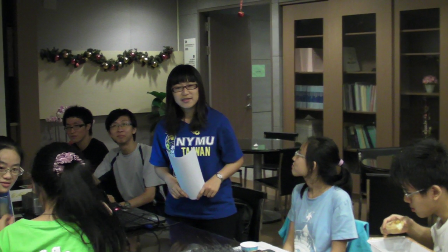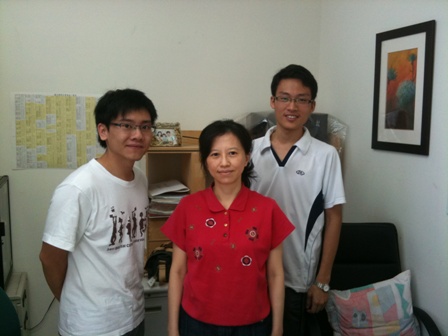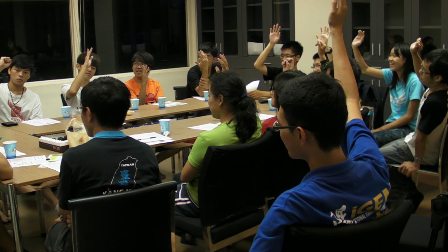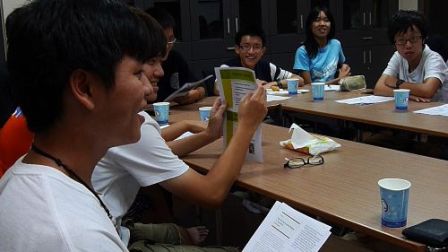Team:NYMU-Taipei/human-practices
From 2011.igem.org

Contents |
Synthetic biology -- Human Practice


Introduction
Human practice in Yang Ming University involves two independent yet complimentary practice The first practice involves multiple individual interviews with professors from different fields including oncology, biomedicine, biochemistry, neuron, protein-engineering, and bioinformatics. Specific viewpoints from different perspectives into synthetic biology are sought by our team. Under these series of interviews we aim for gathering insights from different backgrounds of professors to rethink about the field: What is synthetic biology? How does it operate? And where should it be applied?
The second part of our human practice was the night event in Sep 16th. This “Human Practice Night”— was held for project-oriented discussion. We targeted the population of freshman who study in the departments of Medicine, Biomedical Engineering, Life Science, Dentistry, and Medical Engineering in our school and aimed for acquiring the teenage population's reflection about our project. After a brief introduction had been given on what iGEM is and how synthetic biology works, special focus was then given on neuro-ethics and mind-control issues - issues which are highly associated with our project.And a brand new approach-Role Playing Strategy is introduced to our discussion part.
By combining both practices we aim for building a thorough networks which wraps up every aspects of our project as well as its key role in synthetic biology.
Professor-targeted Interview
Interview Structure
Multiple individual interviews with professors from different fields are oprated in process as below:
1. Basic and fundamental questions are asked regarding first image of synthetic biology. .
2. Short course –
i. Brief explanation and description for synthetic biology and iGEM development history
ii. Standard synthetic biology example and applications on iGEM
iii.Bridge between synthetic biology to human practice: arising ethical issue and social impacts
3. Interdisciplinary linkage- insight or reflection into synthetic field driven from individual academic profession
The Very Initial Image
When you think of synthetic biology, the very initial image is,
1. One branch of genetic engineering
2. Agriculture or vaccine industry using bio-manufacturing techniques
3. Industrial chips that work on organisms which can be manufactured
4. Combination of different fields of biology to solve problems
5. Usage of new, non-biological, industrial materials to make cell Ex: making artificial membrane
6. Creating artificial life that do not exist
Special point : Traditional biology was to find a natural phenomenon and explain it, but synthetic biology, on the contrary, reverse the concept by making circuits based on known theory and test whether it works!
Social Impacts
The overall impacts of synthetic biology on general public may include but are not limited to:
1. The problem of artificial life, specifically artificial humans.
2. The enlarging wealth gap resulting from the capability differences between the upper and lower class people utilizing the field to harvest for their interest.
3. The accompanying social risks of crime as well as terrorism that would seek new opportunity for their intention.
Project-oriented discussion
Background
When we send signals to one human brain and make him do things whatever we like, does it mean that his mind is under our impact, or is this just merely behavior manipulation, leaving the soul independent and solid? This is not only a medical problem, but also a philosophical one ...
Opening Survey
With regard to the neuro-ethics part which highly concerns our 2011 project, high interests and attention are given by the attending colleagues, with 71% of members expressing high interest. Below are the different perspectives toward the mind-control’s ethics issue.
Discussion
Brand-New Approach: Role-Playing Strategy
Role-Playing Strategy is a strategy that we assign different roles to each participants who attend our convention. Participants are encouraged to express their ideas and insights based on their roles and give comments centering our main theme which includes
1. Synthetic neurobiology
2. Patent application in synthetic field
3. Project-associated neuroethics
Below are the results of role-playing strategy which help us probe all aspects of neuron-stimulation’s ethics issue:
1. Law maker: When mind-control system has developed to a state that human application is possible, the field and its application on humans should be totally forbidden in law to prevent arousal of further ethics issues or crime.
2. executive administrator: Should prompt the development of this field for the purpose of strengthening the national force or encouraging scientific breakthroughs.
3. Evolutionist: If mind-controlled beings were put into war and one day caused human beings to die out, it’s still a natural phenomenon of evolution. We cannot blame the initial technology!
4. Taxonomy worker: Mind-controlling organisms may resemble robots, but it still owns characteristics of life and cannot be regarded merely as machines. Thus, new species may exist for this category and cause problems for naming.
5. Educator: Mind-controlling technique should be applied to education for it can help strengthen memory as well as speed up learning. Traditional learning methods will be changed forever! More “Einsteins” would exist.
6. Police: We can control behaviors of some criminals committing serial murder or sexual assault to prevent them from re-offending. Though new crimes associated with mind-control may also exist.
Ending survey
Before the human practice night ended, an oral survey had been given on attending colleagues toward “whether mind-control’s net profit on society would be more positive or negative”: 21% voted positive versus 69% vote negative.10% of people voted the net profit is zero. The general public might not be well-prepared for mind-control in its current state.
 "
"












